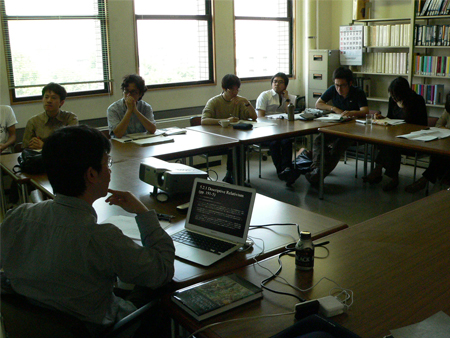中期教育プログラム「脳科学と倫理」セミナー(3)第8回報告
中期教育プログラム「脳科学と倫理」についてご報告します.
今回の報告はセミナー (3)「Prinz "The Emotional Construction of Morals" を読む」の第8回.第5章 “Dining with Cannibals” の後半を検討しました.
【プレゼンテーション】 吉田敬さん (UTCP若手研究員)
Prinz's The Emotional Construction of Morals". 第5章 'Dining with Cannibals' 後半 PDF (3.6MB)
【報告】 佐藤亮司さん (若手研究員)
In session 8, we read 5.2 “Objections to Relativism”. Prinz tried to meet four objections to relativism here. The first objection is concerned with descriptive relativism. Descriptive relativism is prima facie right, but some maintain our morality does not diverge as it appears. Since metaethical relativism presupposes descriptive relativism, it is problematic for Prinz’s position that our morality does not so vary. Prinz showed the divergence of morality is substantial in 5.2.1.
Second, you can criticize metaethical relativism for its incoherence. According to metaethical relativism, one and the same judgment can be true and false, because the truth conditions of a moral judgment depend on the context. If you relativize a moral judgment to the speaker or the agent, you can avoid this undesirable consequence. But this solution falls prey to a Davidsonian objection. Adopting content relativism, a moral judgment changes its meaning according to contexts. Then, it becomes dubious to say moral terms (e.g. “good”) are still moral after contexts are changed. If someone says “murder is good”, then the meaning of “good” is different from my “good”. In this case it is uncertain that “good” in the speaker’s sense is moral. Prinz responds to this criticism by appealing to moral sentiments. We can identify a person’s moral sentiments such as anger, disgust, and shame by observing his/her reaction. Those who have moral sentiments can make relevant moral judgments. Even if people in another culture used moral terms differently from us, we can say they were using morally important terms—if there is a sufficient similarity between them and us.
The third objection is the indexicality of moral terms. If content relativism is true, moral terms have a context-sensitive meaning. But moral terms do not behave like paradigmatic indexical pronouns, such as “I”, “you”, and “he”. Cappelen and Lepore* invented syntactic tests to see whether a word is really indexical. Moral terms seem to fail the tests. Prinz showed there is at least one indexical reading of moral sentences in each test.
The final objection dealt with harm of relativism. For one thing, it seems that relativism makes genuine moral debates impossible; for another thing, we cannot be confident of our morality if morality turns out not to be absolute. Relativism seems an insidious theory. Prinz argued for relativism by repelling this objection. First, Prinz maintains relativism has an attractive consequence: relativism promotes tolerance. Second, we can be confident of our values, endorsing moral relativism. We cannot believe our moral judgment is categorical, but we can be confident of it. For example, we can be confident that cannibalism is wrong for us. Prinz also argued that we can have moral debates. We can find common basic values through debates. After that, we try to change others’ non-basic values and practical actions.

According to Prinz, you can intervene in other cultures, even if you endorse relativism. When you find people on whom others’ morality is unwillingly imposed, you can help them. This is because imposing values on people who do not endorse them conflicts with the relativist’s doctrine.
But Prinz’s argument here sounds far-fetched. First, it is very hard to determine whether a person is willing or unwilling to do something. Suppose I am on a diet. I am unwilling to eat a hamburger, but at the same time, I am still willing to eat a hamburger. To settle the question of whether I am willing or unwilling is really tough.
Second, some may criticize Prinz for being a “hidden-absolutist”. Prinz thinks a committed relativist can intervene in other cultures. He said, “since there is not a single true morality, I will refrain from imposing my morality on others, because it has no claim over them; and likewise, I would hope that they don’t impose their morality on people who do not share it; but if the victims of their actions do not share their morality, then my initial reason for not intervening doesn’t apply” (p. 210). It looks that Prinz advances relativism in an absolutist way. But, I think this attack is not successful. Prinz certainly regarded the value that “you should respect other’s values” as absolute. It looks self-contradictory to the relativist doctrine: no value is absolute. I think this contradiction can be avoided if you consider the value that “you should respect other’s values” is a second order value. If you limit “values” in the relativist doctrine to the first order values, self-contradiction can be avoided.
Third, it may not be enough to help people with whom we have similar values. In the female circumcision case, we can help African females if they do not want to undergo circumcision. But we and African females are really distant. We do not have much interaction. We may happen to have some values concerning about circumcision, but we probably have many values that are different from African females’. It must be so risky to intervene in such people. We cannot incorporate these females into our society because we and they would have many different values. At worst, the only thing we can do might be to destroy their society.
When it comes to apply moral relativism to a real case, many problems arise immediately. These predicaments indicate the real difficulty of moral discourse.
* Cappelen, H., and Lepore, E. (2005). Insensitive Semantics, Oxford: Blackwell.

PDF版をダウンロード⇒
【レポート】Prinz's The Emotional Construction of Morals". 第5章 'Dining with Cannibals' 後半 PDF (62.8B)






